January 22, 2019
Today we woke up for our usual breakfast of omelettes, buffloaf, fruit, and bread with eggs. We enjoyed good conversation over breakfast, tea, Starbucks coffee, and Milo.
Following breakfast, the group headed straight to the Public Records and Archives where we learned about the way in which the archives are stored, what their contents hold and got our questions answered.
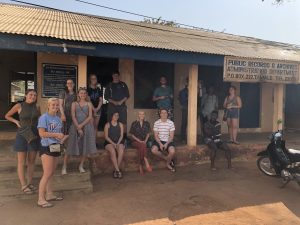
These were some of our findings:
1. The archives are incredibly underfunded because all services at the archives are free, so the government is unwilling to fund more than 2,000 cedis per quarter. Government officials don’t recognize the true value of the documents or the fact that they have the potential to change attitudes, reveal untold narratives, and expand minds. This underfunding results in tremendous issues with maintenance as they can only afford to fumigate every 3 months to prevent damage from pests – not nearly enough precaution to maintain the records that are held. The archivist said that if they were to receive adequate funding, the first thing they would do is digitalize all of the documents so that they could increase awareness and accessibility. They had aid recently, from the Government of the Netherlands, to digitize some of their holding. It’s over, but how do we make what is digitized now accessible to the general public? The public records office will require a cloud storage, in a country, where some are stll behaving like the Ludites.
2. Erin and Emma Zieber stayed later to examine the archives and were struck by the importance of keeping and maintaining all of the documents, even when some seem nominal and unimportant–specifically they read about the parks department, and despite the papers being of a less intense subject than slavery or post-war development, between the lines was a lot of relevant information about the environment, unions, and currency. The archives are large, and efforts must be made to increase the storage capacity. We were also informed of the “white elephant” archives project located opposite the defunct Cathering Rest House and on the road to the Residency, which was started several decades ago and ultimately abandoned.
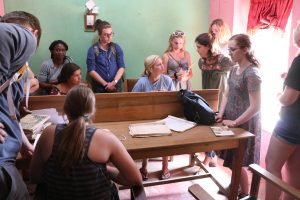
3. The archives hold a wealth of information and history, and when reviewing them it is important to read between the lines and see the documents within their overall historical context. This is especially important when reviewing documents relating to slavery, as the source of the documents and the bias of the historical time period must be considered. But interestingly, locals who patronize mainly focus on family Histories, and only a few local scholars visit periodically for academic work. Foreign scholars do visit, and it is these internationals who seem to be interested in the public records holdings.
Tamale Tourist Board
After we looked at the archives we visited and had discussion with all the staff of the Ghana Tourist Board offices in Tamale. We discussed some of the experiences we have had with the various tourist attractions around Tamale. We mostly discussed Saakpuli Slave market and the conditions we observed there. They informed us of the conflicts they run into trying to increase tourism, and having to rely entirely on the individual villages and not having any control over what they choose to do with the money they donate, only increases the odds.
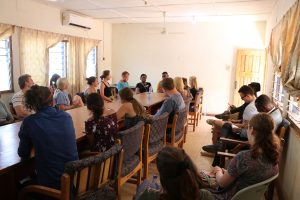
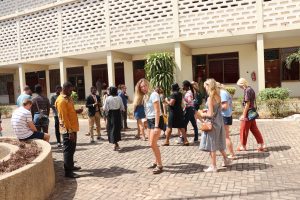
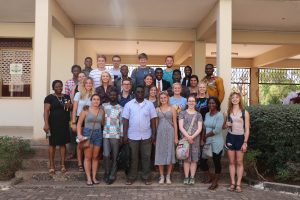
After the archives and board of tourism, we were able to shop in a new area, Tamale Center for National Culture. The stands were selling more touristy items and many in the group bought artwork as well as trinkets for their family and friends.
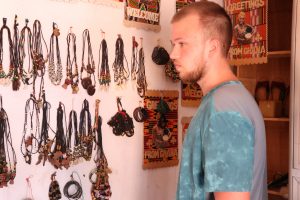
From the market, we moved on to a lunch of TZ and fried cheese. We headed back to the hotel for some rest before some went back to the Youth Center and the tailor.
We came back together as a group for a dinner at KFC. We headed back to the hotel for the rest of the night excited about our last few days in Tamale.
Ty, Zieba, Ben, Katie
